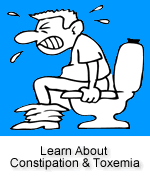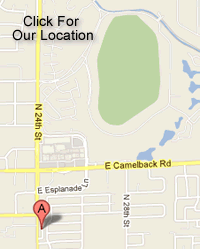One hundred percent of American adults, if they live long enough, have herniation of the bowel. The number one cancer among men and women together is colon/rectal cancer.
Maintaining a healthy colon is important for maintaining overall health. The focus of colon therapy is to maintain or regain regular bowel function.
Regular bowel function means thoroughly eliminating food wastes eighteen hours after eating. After food has passed through the small intestine (eight to ten hours after eating) it enters the colon for final processing and elimination.
|
|
|
Diseased Colon
|
|
click to enlarge
|
The large intestine or colon is made up of six sections: the cecum, ascending colon, transverse colon, descending colon, sigmoid and rectum. In total, the colon is five feet long and two-and-a-half inches in diameter. A healthy colon requires good nerve and muscle tone, and proper circulation, as well as adequate nutrients and pure water.
The colon is the sewer of your body. If it's not cleansed, the waste throughout the body can't get out. According to some estimates, about 70 million Americans suffer from bowel problems. These statistics cover only those people whose problems are severe enough to cause them to consult a medical doctor. People who aren't even aware that they have a bowel problem are often in the worst condition.
When the colon is healthy, a person will have two or more well-formed bowel movements a day. Every morning, they'll have a huge movement, which should altogether be from 2 to 4 feet long. Later on in the day they'll have another movement, which will be about half the size of the first. These stools should be expelled effortlessly--within seconds after they sit down. If you have to strain or if you have to read a magazine while you wait for a movement, then you
are constipated.
Another indication of poor bowel function is if your stools are small and narrow, or if they are short or hard. You shouldn't see any mucus, half-digested food, or blood.
Bowel problems can cause nutritional deficiency, regardless of how good your diet is or how many vitamins you take. A poor diet creates sticky fecal matter. When there is not proper elimination, deposits of fecal matter build up along the wall of the colon or in the pockets of the colon. That's why even a mild case of constipation is a serious problem.
Normally, the body pushes wastes out of your colon in eighteen to twenty-four hours. However, when you're not eliminating properly, these wastes may not leave for days. Usually the material deposits along your colon walls, it may not leave for months or years.
These deposits of fecal matter in the colon get irritated. This may lead to a spastic or inflamed colon, conditions that interfere even more with nutrient absorption and also with proper bowel function. The feces that remain in one's system begin to decay, releasing toxins and poisonous gases that seep out into the blood and poison all the organs and tissues.
The blood stream itself gets polluted, preventing it from removing the cells' wastes. So the whole system is poisoned by wastes.
There is really only one disease--autointoxication and malnutrition. When the body is deficient, it gets toxic, from fermentation of undigested food. When toxic compounds are formed during fermentation of foods in the colon, numerous potentially serious consequences result.
These toxins include ammonia (liver toxin); amines (liver toxin); nitrosamines (carcinogens); phenols and cresols (cancer promoters); indoles and skatoles (carcinogens); estrogens (suspected carcinogens and breast cancer promoters); secondary bile acids (carcinogens or active colon cancer promoters); aglycones (often mutagenic); and others.
When the body is toxic, the cells cannot receive nutrients from the blood because the interstitial fluid surrounding the cells is plugged-up with wastes from sluggish lymphatics. This internal poisoning also causes mental depression and morbid thoughts. It's a vicious cycle--one condition feeding the other like a dog chasing its tail.
Most people, instead of cleaning out their colons use incense, air fresheners, underarm deodorants, foot powder, mouthwash, toothpaste, breath fresheners, perfumed sprays and colognes to cover up their body odor because they are filled with impacted fecal matter.
If the colon doesn't get cleansed, the other organs can't cleanse their waste. If a person can't get the bowels cleaned out, even if they clean the plaque out of the arteries--it's going to go back into the body. They'll just re-absorb it. Unless they clean out the colon, they will never regain vibrant health.
There are several causes of bowel malfunction. If enough water isn't consumed, the stools will be too dry. The same thing happens if the urge to go is ignored. The longer the stools remain in the colon, the drier they get, because the body extracts moisture from them. So the stools are difficult to expel and constipation results. Lack of physical exercise is another cause of poor bowel function. As with other muscles,
the bowels benefit when exercise is taken regularly.
A sedentary person's bowels become weak and can't do their job of propelling the wastes out of their body. But these are all relatively minor causes of poor bowel function. The main cause is simply malnutrition. Most people don't eat enough nourishing food to supply the muscles and tissues of the bowel with needed nutrients. The bowel begins to deteriorate and lose its muscle tone. Besides weakening the bowel, poor diet also causes hard stools.
For example, if refined sugar and flour are eaten, these will dry up the feces. Moreover, if the diet lacks roughage, there's not enough bulk to push wastes through the colon. Even though diet is a major cause of sluggish bowels, the answer in NOT simply to eat better food.
Many people who have switched to a natural raw food, properly combined diet, still are constipated. One reason is that a person who has eaten poorly over a period of time has usually damaged the colon--then it's too late for diet alone to do the trick. Another reason is that fecal deposits may have become so hardened and thickened that diet alone won't get rid of them.
The body's tissues won't eliminate wastes unless the colon is working. The bodily systems are connected. When the colon is cleaned out, the body will start pulling poisons out from everywhere, because it can.
Wastes from the colon can leak out and pollute other organs. Other organs can be treated with natural methods--with only partial results--because these organs keep getting re-infected or re-irritated by poisons from the colon.
The impacted colon creates diverticulosis which are herniations or pockets in the wall of the colon that contain fecal matter. If it stays in there long enough, it will leak into your body and cause what is called auto-intoxication.
These diverticula cannot usually be detected inside the colon with colonoscopy, but on the outside of the colon where you can't see. The bowel pockets leak pus, toxins, and fecal matter back into the bloodstream.
Diverticulitis, an inflammed diverticula, is becoming more common, because people's diets have gotten worse. It is estimated from autopsy studies that 30% of all adults have diverticular disease and over 50% of those over 40 years old.
Diverticulitis is associated with a heavy meat diet and processed foods. Before the 1920's, this disease was almost unknown. It is a 20th century disease, as is heart disease, canceer, and most of the degenerated conditions that people create.
It takes many years of bad habits to weaken the bowel enough to form diverticula. It is rare in parts of the world where dietary fiber intake is high (vegetarian).
Diets low in fiber result in small stools that require high intracolic pressures for their propulsion in the colon. This high pressure leads to herniation or protrusion of the mucous membrane through the weak and toxic points in the colon's musculature at the sites where blood vessels enter the colon wall.
Diverticula are common in the small intestine as well as the colon. Jejunal (middle small intestine) diverticula are usually asymptomatic, yet, may contribute to malabsorption of Vitamin B12. Often these diverticula protrusions are at the entryway of blood vessels, allowing toxic waste to enter the bloodstream. Fecal obstructions can cause appendicitis. The fecal matter obstructs the opening of the appendix, preventing the fluid from being released and gets inflamed.
Parasites are created by nature to consume this filthy condition but they consume the body's nutrition and also excrete toxic poisons that add to the body's toxic burden. Leg ulcers will never heal until you cleanse the colon. We create them as a "second rectum" which leaks wastes out of a clogged-up body. When the body can't eliminate through the normal channels, it will expel the toxins anywhere.
If the bowel is cleansed and then the ulcer is treated, it goes away. Tumors can be the body's way of trying to dispose of wastes. Sometimes these external cancer tumors have little holes in the outside, where they leak pus and blood. Sometimes the skin turns red and darker in color, and then splits open and drains.
DISCLAIMER: This area is for information only, and should not be considered as medical advice. It is supplied so that you can make a informed decision. All information on our site are not intended to diagnose, cure, mitigate, prevent or treat any disease or health conditions. Pleas understand We do not claim to cure or treat any disease or injury. We give no medical advice; none of the wording in this office has been evaluated or endorsed
by the FDA or any other organization. Please consult with your health practitioner before considering any therapy or therapy protocol.
|



